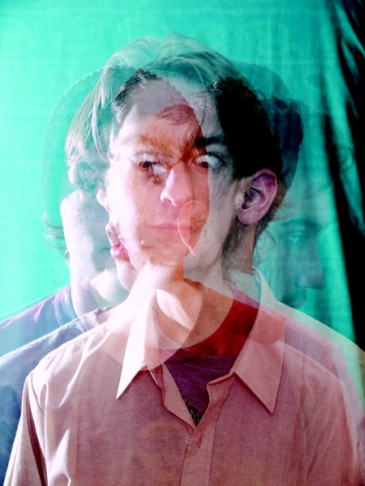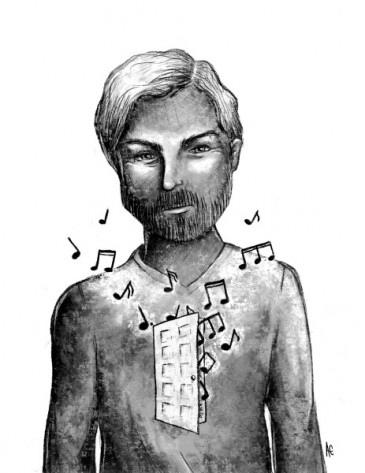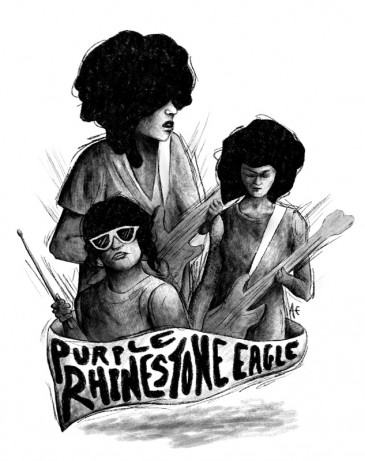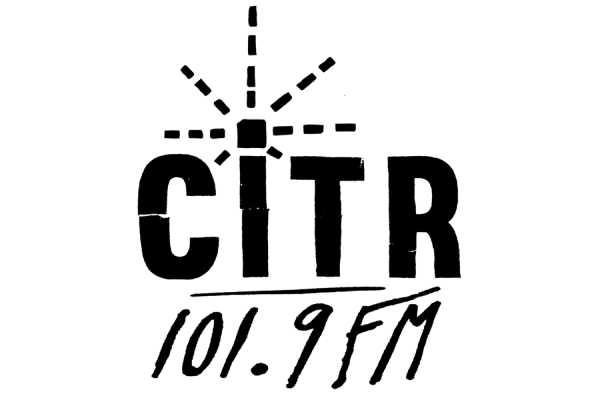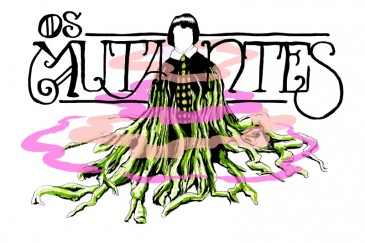
A Minha Menina
Sergio Dias is the leader of the genre defining Tropicalia band Os Mutantes (the Mutants). In 2009, Os Mutantes released their first album since the ‘70s, Haih… Or Amortecedor, and are currently on tour with Ariel Pink’s Haunted Graffiti. Just before leaving on tour Sergio Dias took some time out of packing to chat with Discorder. This conversation was over an hour long, but we’ve distilled it down to the best bits.
Discorder: To start, I’d like to ask you, especially for all the people that may not know a lot about Os Mutantes and the whole Tropicalia movement, just to give your own three minute history of everything up until now.
Sergio Dias: Wow. [laughs]
D: You might be able to have more than three minutes.
SD: Yeah I can. During the ‘60s the world suffered a huge transformation, it happened, you know, in America, there was a big change in politics and in social movements and in arts and everything. It was a huge vortex of energy in the entire world—and the world then was much much larger than it is today. You know today is a very small world. It’s so easy to be anywhere and to get information. And the beautiful thing is that all these thing happened simultaneously in the ‘60s and at the same time that was happening, things like the Flower Power movement in America, or Beatle Mania in England … I think the reason why it was so weird, I think it’s because Brazil at the time received information in very truncated bits and pieces, kind of a kaleidoscope of everything. For instance for the Flower Power, we didn’t get the Power, just the Flower, and there was no idea what was going on in Vietnam. We heard about it, but we didn’t know how much involvement was in this. We had our own problems here with the coup d’état and the military government here, so we were basically reflecting what we were feeling and we didn’t really have any concrete connection to any of those movements in Europe or America but it was a very pretty thing to see because it was so instinctive and … without any planning. And it’s beautiful to look back and see how that thing could happen, and in Brazil it was very, very strong very powerful. Television then was a nice place to be ‘cause there was a lot of cultural and musical programs … and all those things were followed by the entire country and so it was an amazing thing to see. So besides all the political problems we were going through with the military and the government and torture and the movement against it, and there was all this crazy movement which was the Tropicalismo [ed. another name for Tropicalia] which was basically—I wouldn’t call it anarchy because it was freedom of thought really. So it was funny ‘cause they couldn’t really label us [in the Tropicalismo movement] because we had elements of everything, a bit of American influence, English influence and there was the Communist party and all this mess, like the witches brew, you know, of all these angry ingredients and I think the music and art that came at the time reflected this moment. It was so unique. … It was an amazing cascade of different styles and different modes that were coming and changing everything day by day and that was an a amazing thing ‘cause you learn to assimilate the things very fast and you would respond to it very fast and I think that’s basically what Tropicalismo did in Brazil.
D: Yeah. Getting back to the musical thing … It’s funny because, initially, well I’m not sure if you would consider yourself a political band or not?
SD: I don’t think we’re a political band, you know, we’re political beings. All the sayings … permeates our lives, permeates our spirits, and we … chew it and spit it out, you know, and the way that, whatever comes, all the information is welcome.
D: I want to ask about this quote from the liner notes off your second album Mutantes, by Nelson Mota: “He who lives in a consumer society has two alternatives: either participate or be devoured by it; there is no escape from these options.” He’s talking about your commercials for Shell Oil. Like, what do you think about it?
SD: We did a commercial for Shell, but we did it, and we put it on the album as a song [“Algo Mais”]. We didn’t treat it as a thing made specially for this purpose. I wrote the song, and … we liked it as much as any other song, so we used it in the album as music. I mean, as a piece of composition, you know, it is in the album. I think we, on the other hand, we can devour it also and put it out in another form.
D: And, it’s interesting, the way it goes with your name. I mean, it’s almost like you’re mutating. You’re mutating that ad, in a way.
SD: Yeah, because the thing is, if you’re never exposed, for example, to the bad things, let’s say, or if your immune system is not ever violated, you’re too fragile. You cannot be that fragile. I think it’s very important for us, as human beings or artists, to be exposed to whatever media that exists, and to be able to make art on any of these medias. That’s the trick, that’s the important thing. For example, let’s say, the guy—I don’t remember his name—the guy who did all those posters in America, remember? In the Second World War?
D: I don’t know his name, but I know the ones you’re talking about.
SD: Yeah, he did a fantastic job. Or for example, even the French artist [Henri de Toulouse-Lautrec], who did the posters for the Moulin Rouge, beautiful art that he created. He was doing that, and he was making [money]. With this, he created an entire new perspective of art, and he was doing it basically for hire. … And this is, to put it on the same level of any other great artist in France, which is fantastic. And, for example, this guy in the States—which I don’t remember his name, I’m sorry—he was so important in the posters, you know, and was beautiful, the stuff that he did. And there is so many weird things in the world for them. Like that girl [Leni Riefenstahl] that did Adolf Hitler’s films. She invented a bunch of new ways of filming, like moving cameras and all this stuff. When she did the commercial things for the Nazi movement, and even if it was that terrible, evil thing, if you looked at the art aspect, there is the development of art in there. So it is important to be exposed to good and evil. There is no white without black. You have to have a balance. And with yourself, I think you have to be able to live with all these things, to be able to recognize what is good for you and what is not good for you.
D: It’s interesting, like, this sort of yin-yang, light-dark thing, because to an extent your, you and Os Mutantes, you were enemies of the state, in a way.
SD: But, the state was our enemy, before we decided to do anything. They were the enemy, you know, I mean we were considered the enemy, and they were attacking us. … So we started fighting back. That’s the natural law of survival, you know, if you’re attacked, you fight back. And in terms of art during that period, whenever the censorship, for example, came and said “Oh, you cannot use the word sword in your songs,” we would never change the word. We would mutilate the song and put a noise on top of it. Like, there is a place where it says “armadura e lança” which is like, “armor and spear to ruffle,” and that was not permitted. So we put a noise on top of it, like [makes sound of static or distortion]. … And when we used to perform, we’d just sing with the right lyrics. So we record it and we show that it was censored, you know, that was our way of doing it. We didn’t explode any bombs or anything like that, but just the way that we were, you know, I think that was enough to bother a bunch of people.
D: Do you consider yourself a contrarian? A devil’s advocate?
SD: A what? I don’t understand, sorry.
D: Somebody who says something that’s against the norm at any given time, not necessarily meaning what they say but somebody that’s sort of shaking up the system a little bit.
SD: I love that. I think it’s very necessary. I think the worst thing in the world is a place where it’s always blue sky, there’s no rain and nothing happened. No, I think you need some tornadoes around, or some earthquakes here and there so you can shake the ground. Otherwise you just fall asleep. I think it’s very important to face things and to be able at least to joke about it. I mean, you don’t need to be a radical poet that is doing protest songs. Sometimes if you make a good joke out of it, it’s more effective.
D: Speaking of the radical poets doing protest songs, what was your relationship, you and Os Mutantes, to people like Gilberto Gil and Tom Ze, contemporaries who may have been more political than others at the time. How did you get into that scene?
SD: Well, we were kids. You have to realize that when I was playing with Gil, I was 16 years old. Even though I was coming from a family of politicians—my father was the right arm for one of the governors of Sao Paulo or whatever, and politics was in the house, but never as a huge topic. On the politics side, for the Mutantes, it was totally an anarchical thing because we were kids, and kids are anarchical. We are against, always, because basically that’s nature. You know, you have to be against the status quo to be able to become a new generation. I think this is basically the longevity of your youth, for how long you are able to keep being like this. … But the great thing for me now was, for example, when we released the last album, Haih… Or Amortecedor. I was lucky enough to re-encounter Tom Ze, in 2007 I think, when we first played in Brazil and he played at the same show. We finally could communicate in an intellectual level. At the [original] time [we met], you know, what would I say to the guy? I was just a kid playing guitar. I was even a virgin, I had never even kissed a girl probably. And now, you know, I think he became one of my best musical partners. And the job that we did in Haih… Or Amortecedor is something that I’m so damn proud of. …
D: What’s your relationship like with the contemporary music scene? Like right now, your tour with Ariel Pink, who’s one of the more challenging major artists in the world right now, how did that come about? Did you seek them out? Did he seek you out?
SD: No, I don’t know them yet. I know their music, but we’re gonna meet now at the show. I don’t know exactly how this marriage happened, but I think it was probably the sensible thing to do, to put Ariel Pink and Mutantes together, because probably we are the same with a different kind of perspective. I think it will be a fantastic experience for both bands beside the audience because we are going to be able to enjoy each other and this is what it’s all about, you know, living side by side on stage. That’s the great thing. I think it’s going to be a great thing, and maybe something fresh will come out of that.
D: Hm. Because it’s really interesting the new Os Mutantes album, Haih… [laughs]
SD: Haih… Or Amortecedor.
D: Haih… Or Amortecedor. This has not been my strong suit, pronunciation, especially in foreign languages. [The album] surprised me that it’s distinctively Os Mutantes, even though you are the only member left from the band back when you were like Os Mutantes all capital letters. It still sounds like, you said you had that frame of reference when you were recording the album that that’s what you were trying to do and it works.
SD: Yeah, I think it’s my job, in terms of putting this album together, was basically to filter. … When you are under the Mutantes umbrella, it is a total different kind of magic. For example, I would never write a song like “2000 e Agarrum,” as a solo artist. It doesn’t work. I don’t know why. But for Os Mutantes, it makes total sense. And I’m able to do it. And when I’m playing or doing a solo album or something like that, I would go to a total different direction and it’s amazing to see this happening. You know you have no power at all over this thing. And see that you are like a simple antenna really that is picking up some kind of special radio wave and it is basically the Mutantes wave. And it is a fantastic thing because—you should see it happen—most of what you hear on the album is always first take and that is fantastic because it is so fresh. For example, Bia [Mendes] singing “Querida Querida,” that was her first take and she never sang in that region before and I just told her do it, “Try this, try that” and she just did and she just did it in a way. And she was always saying “Oh let me try again, let me try again” and I said “No way,” that’s the take because I knew it was great. And the guitars are always first take and the singing. Most of the stuff is all first take.
D: So no auto-tune huh?
SD: No way!
With transcription assistance from: Andy Hudson, Kaitlin McNabb, Saralyn Purdie, Andy Resto, Sally White, Alicia Wooding


